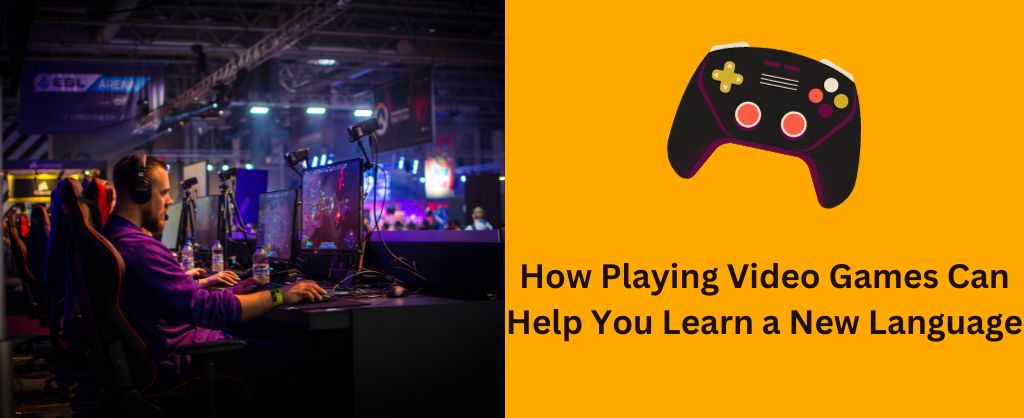How Playing Video Games Can Help You Learn a New Language

Video games have become an incredibly popular pastime over the last few decades. With advanced graphics, engaging stories, and interactive gameplay, it’s no wonder so many people love to play video games in their free time.
But can video games do more than just entertain? Is it possible that playing video games could actually help someone learn a new language? In this article, we’ll explore the potential benefits of using video games for language learning.
How Video Games Can Support Language Learning
There are a few key ways that video games can support and reinforce language acquisition:
Immersion
When you play a game in another language, you are immersing yourself in that language. Even if you don’t understand every word, you are seeing and hearing the language being used in context.
This type of immersion can help train your brain to better recognize vocabulary and grammar patterns. The more exposure you have to a language, the faster you’ll pick it up.
Motivation
Video games are inherently engaging and rewarding. Leveling up, unlocking achievements, and progressing through a story can motivate you to keep playing. This motivation can reinforce your commitment to learning the language so you can better understand the game.
Gamification uses game design elements to make non-game contexts, like language learning, more rewarding and enjoyable.
Repetition
As you replay sections of a game to progress further, you are repeatedly exposed to vocabulary and phrases. This repetition allows you to practice and retain what you’ve learned.
Games provide a fun way to repeat new words and phrases until they stick.
Context
Since dialogue and narrative occur within an interactive context, language is experienced in a more natural way.
Seeing how words and grammars are used to accomplish goals within a game environment can provide practical examples of how to apply the language.
Low Pressure
Playing games reduces the anxiety of formal studying because they feel more like recreation than learning.
With the pressure off, you can focus on soaking in new information and enjoying the ride. Reduced stress keeps the learning process fun and converts knowledge more efficiently.
Types of Games That Can Help
Certain types of games lend themselves particularly well to language learning:
Story-Driven Games
Games with rich stories, intricate worlds, and cinematic cutscenes tend to use advanced vocabulary and complex dialogue.
Popular examples include action-adventures like the Legend of Zelda or Final Fantasy and roleplaying games like Elder Scrolls or Fallout. Following along with an engrossing narrative motivates you to understand what the characters are saying.
Text-Based Games
Some games rely heavily on text and reading comprehension. Many old-school adventure games fall into this category, like Zork or King’s Quest.
Modern indie games also employ this style as a callback to classic gaming. When gameplay involves reading descriptions, examining objects, and making choices, your literacy gets a thorough workout.
Language-Learning Games
A number of educational games have been developed specifically to build foreign language skills. These range from simple vocabulary and phrase training apps to more extensive multiplayer games that teach a wide range of language concepts.
Popular titles include Duolingo, Rosetta Stone, and Busuu. While perhaps not as exciting as commercial games, educational games are designed explicitly around language acquisition.
Multiplayer Games
Online multiplayer games present great language learning opportunities because you use the target language to communicate with real people.
Massively multiplayer online (MMO) games like World of Warcraft or Final Fantasy XIV have huge player bases worldwide. Making foreign friends and chatting while you play is a fun way to practice conversational skills.
Localized Games
Many game studios release versions of their games translated into various languages. By playing a game specifically localized into the language you want to learn, you get full immersion.
Popular global franchises like Pokemon and Super Mario come in a wide range of language options. Seek out a familiar game localized into your target language for a recognizable context.
Specific Benefits of Using Video Games to Learn a Language
Let’s take a closer look at some of the concrete benefits you can gain by incorporating video games into your language studies:
- Vocabulary Acquisition – Games use visuals and dialogue to repeatedly expose you to new vocabulary words and phrases in an engaging way. Seeing language in context helps words stick better than traditional memorization.
- Listening Comprehension – You have to listen carefully to dialogue and cutscenes throughout gameplay. This develops your listening skills and trains your ear to recognize words.
- Colloquial Language – Because language is often conversational in games, you learn more natural expressions and slang than from a textbook. The language mirrors actual usage.
- Pronunciation Practice – You can mimic the speech patterns and pronunciation you hear from characters. Voice chat with multiplayer games provides opportunity for real conversation.
- Grammar Intuition – When continually exposed to correct grammar structures, you will naturally develop a feel for what sounds right. This intuition kickstarts using the language yourself.
- Reading Fluency – Text-heavy games require you to read a lot of in-game text, menus, and dialogue. This improves overall reading speed, comprehension, and literacy.
- Confusion Tolerance – When playing a game in a new language, you won’t understand everything. But making progress with partial understanding builds tolerance for confusion critical for language learning.
- Cultural Knowledge – Games made within a language community will reflect the culture. You gain cultural exposure necessary for true fluency.
- Motivation Boost – Because games are fun and provide constant achievement feedback, you stay motivated to keep advancing your language skills in order to progress.
Tips for Learning a Language Through Video Games
If you want to supplement your language studies with video games, here are some tips to make the experience as effective as possible:
- Choose a game with language at an appropriate level. If the game is too difficult, you won’t comprehend enough. Too easy and you won’t be challenged to progress.
- Use language options when available. Switch dialogue and subtitles to your target language. Turn off additional languages for full immersion.
- Don’t get frustrated. You won’t understand everything as a beginner. Absorb what you can, stay positive, and celebrate small successes.
- Re-play sections as needed. Repeated exposure across multiple game sessions consolidates what you learn over time. Don’t rush.
- Look up words you don’t know. Use screenshots or transcriptions to find translations for difficult vocabulary. Digital dictionaries help quickly.
- Take notes. Write down interesting words and phrases for review. Note cultural tidbits that provide real linguistic insights.
- Use text guides. Reading game walkthroughs and wikis provides additional reading practice to supplement gameplay.
- Find native speakers to play with. Multiplayer games present a social opportunity to engage with fluent speakers.
- Supplement with other tools. Combine games with textbooks, apps, videos, and conversations for a comprehensive approach.
Conclusion
Learning a new language requires effort over a long period of time. Video games can provide an engaging supplement to traditional studying methods. Their interactive and visual nature makes absorbing vocabulary and grammar intuitions easier compared to textbooks alone.
Story-driven games, multiplayer games, and games made specifically for language learning all offer great options. With the right game and some perseverance, you can have fun while advancing your language skills.
Video games have come a long way from simple arcade amusements. They now present complex worlds with rich stories that can seriously improve real-world competencies like mastering a foreign language.
We’ve only just begun tapping the potential of using games for learning. With smart incorporation, video games can be so much more than idle entertainment and become powerful educational tools.













